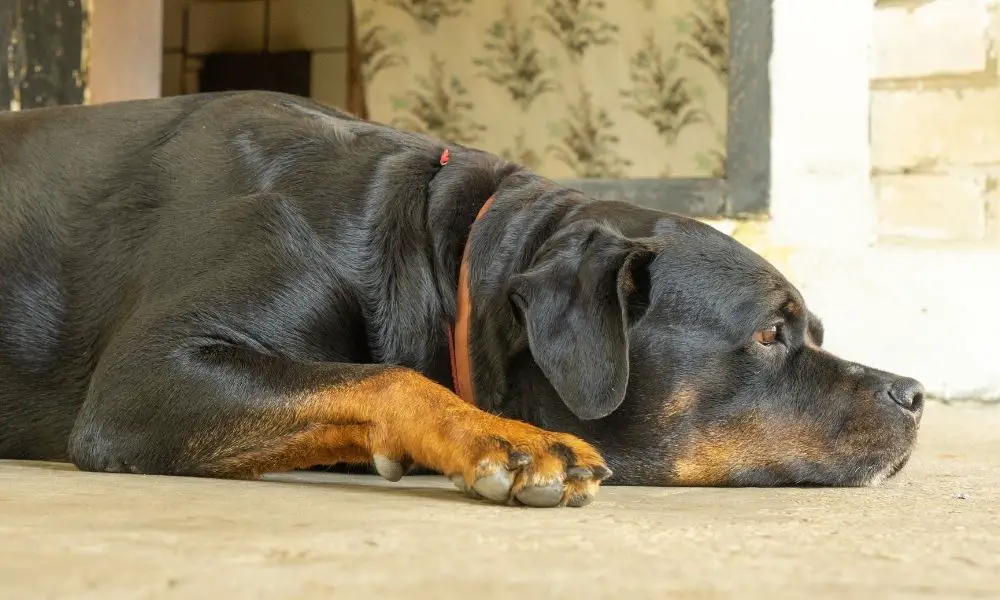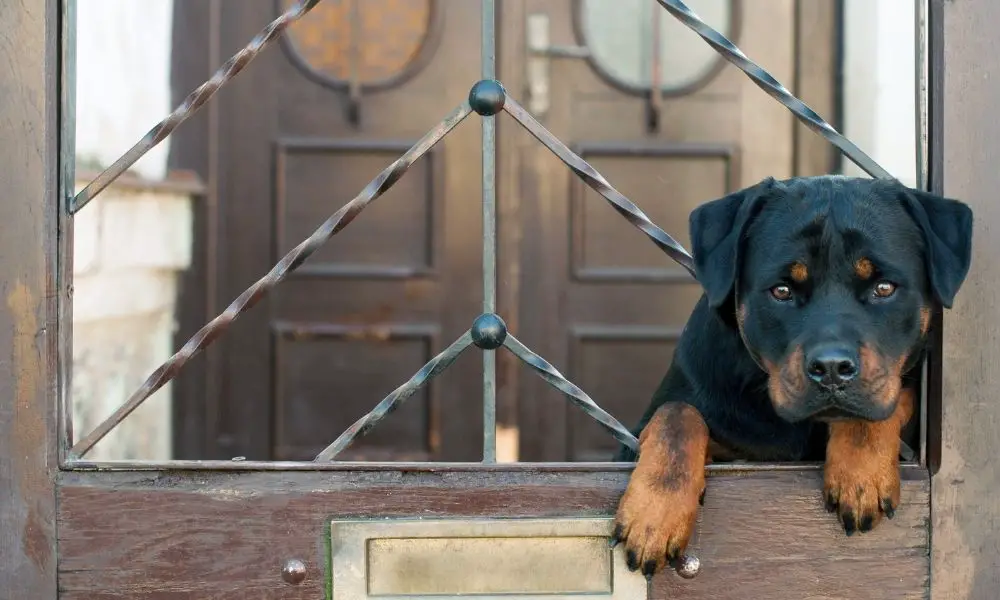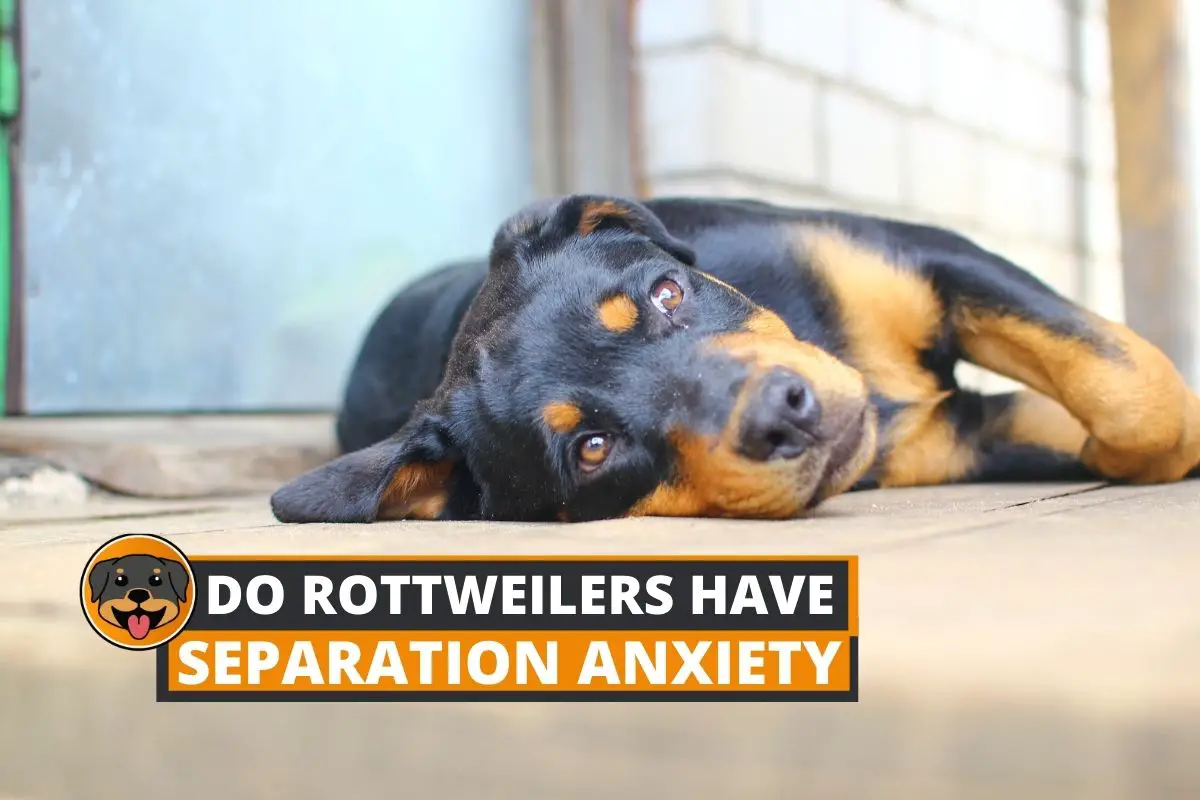You are about to leave for work, and your rottweiler starts barking and whining. You return home and find a chewed shoe and a destroyed couch. What does that mean? Do Rottweilers have Separation Anxiety?
Being affectionate and loyal towards their owners, rottweilers can have separation anxiety. They may start barking or howling when you leave them alone. Failure in dealing with this problem can also lead to destructive behavior.
Like most dog breeds, Rottweilers hate being separated for too long. Often, people mistook their misbehaving dog for having a lack of training or just plain stubbornness.
If the underlying problem is related to separation anxiety, you will have to incorporate new routines without putting too much stress.
Causes of Separation Anxiety
Dogs have trouble adapting to change. The degrees vary depending on your dog and their experiences. Here are three changes that can make Rottweilers anxious:
1. New environment
If you recently moved into a new home, there’s a high chance your Rottweiler will get anxious. Dogs need more time to cope with change.
The different scents and setups can be too much for them to take. So when they are left alone in a new environment, they tend to panic.
The real reason for this is unknown, but most likely, they’re just scared you might not come back home.
2. Changes in the routine
Another reason that can make your Rottweiler anxious is when you suddenly leave earlier or later from home. If your schedule changes, so will theirs.
When your shift suddenly changes, and you had to leave in the afternoon and come back home late at night, your dog will have a hard time understanding this. It might take them a long time to adjust to the new schedule.
3. Changes in the family
Sudden changes in the family can also affect your dog’s mood. If a member has moved out or someone has died, your Rottweiler may become confused and act out due to a family member’s absence. If they suddenly act out when you’re gone, they might be just missing you a lot.
The same thing can happen if there’s an addition to your family or home. New additions like a new pet, a new baby, or even a new roommate can make them feel uncomfortable.
Signs of Seperation Anxiety

Below are some signs your Rottweiler has separation anxiety:
Excessive barking and howling
Rottweilers like to bark and howl. They may do it either as a reaction to other dogs, cats, or even people they see in the window.
However, this kind of barking is different when it’s because of separation anxiety. If they bark and howl while you’re home, then they don’t have anxiety issues.
If they’re doing it while you’re away from home, then this can mean that they have separation anxiety. If your Rottweiler howls or barks for no particular reason when you’re around, it may be going through separation anxiety.
Destructive behavior
Another indicator is when your Rottweiler has a habit of destroying things in your home during your absence. They’ll chew on anything they find when they’re stressed or bored.
Frequent pooping and peeing.
Dogs tend to mark their territory by peeing. Before you rule out if this is due to separation anxiety, check first if your Rottweiler has a bladder or urinary infection. If you think they lack potty training, add a few extra minutes outdoor.
If your Rottweiler pees a lot when you’re not around, then it’s most likely separation anxiety. Sometimes when they are stressed or excited, they also end up making an accident out of the blue.
Lethargy and depression
If your dog suddenly lost appetite and vitality, it’s best to consult with a veterinarian first. On your appointment, the vet will rule out if this is because your Rottweiler is sick or if they have separation anxiety.
Here are some of the signs of depression:
- Lack of appetite
- Prefers to hide and avoid you
- Licking too much
- No interest in any activities
- Sleeps more than they do
Pacing and walking in circles
If you’re Rottweiler suddenly keeps walking in circles or won’t stop pacing back and forth, it means it’s anxious. If it does that while you’re away, it certainly means your Rottweiler has separation anxiety.
If it’s doing that when a particular person shows up, then it means that your Rottweiler is not comfortable around that person.
If these behaviors show up while you’re at home (or while everyone in your family is at home), it isn’t separation anxiety. Otherwise, if these signs happen while you’re away, they are most likely due to stress.
How to deal with separation anxiety?

Once you know that your rottweiler is suffering from separation anxiety, you must take the necessary measures to solve this problem.
Slowly incorporate changes
Slowly introduce yourself being gone for a while so they can cope with your absence. First, affectionately tell your dog goodbye. Then leave and close the door behind you. Your dog may bark and whimper for a while. Don’t come until after 10 minutes first, then gradually increase the time so your dog can adjust to see you leave and return.
You can also leave some toys for your dog before leaving so that they won’t end up chewing your couch. If possible, take them on a walk before you go to work.
Keep them calm
As soon as you return, ignore any display of anxiety on your Rottweiler. These may be in the jumping around and excessive barking. Pat them on the head and tell them “I’m home” or “Hi,” then go about your day.
If you coddle your Rottweiler as soon as you get home when they’re frantic, you’re only encouraging this behavior. Only engage with the dog when they’ve finally calmed down.
If your Rottweiler tries to jump on you, turn your body away repeatedly until the dog understands that this kind of behavior will not be rewarded.
Reward their good behavior
Whenever there’s an improvement in your Rottweiler’s behavior, reward them with affection or even treats. This can help them adjust as well.
Final Thoughts
It’s important to know what separation anxiety is and how to deal with it so your Rottweiler can stay calm even if you’re away. As soon as you find a clue what makes your Rottweiler anxious, you can follow the steps above to lessen the trigger’s effect. Doing so will let your Rottweiler live a happy and healthy life.




